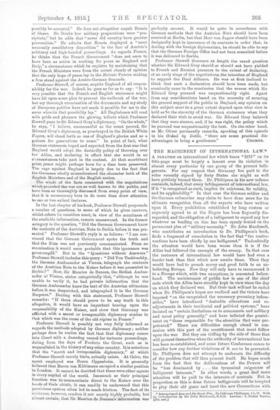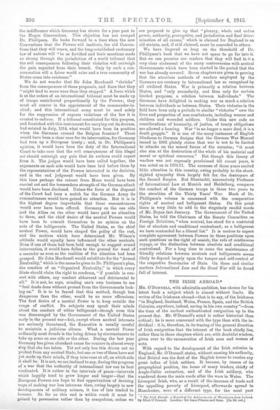THE MACHINERY OF INTERNATIONAL LAW.* A TREATISE on international law
which bears "1915" on its title-page must be largely a lament over its violation in almost every particular by one group of the present belli- gerents. For any respect that Germany has paid to the rules recently signed by forty States she might as well have publicly burned them. Dr. Phillipson in his new volume contends, indeed, that every infringement of international law, if it "is recognized as such, implies its existence, its validity, and its applicability." In that ease the German soldier and the German submarine may claim to have done more for its ultimate recognition than all the experts who have written upon it. Every prohibition established by long custom or expressly agreed to at the Hague has been flagrantly dis- regarded, and the obligation of a belligerent to regard any law whatever as binding on him has been openly denied on the paramount plea of " military necessity." Sir John Mae:done% who contributes an introduction to Dr. Phillipson's book, finds a fragment of consolation in the fact that "the contra- ventions have been chiefly by one belligerent." Undoubtedly the situation would have been worse than it is if the Allies bad followed the example of the enemy. In that case the restorers of international law would have bad even a harder task than that which now awaits them. Then they would have had to preach mercy and good faith to an un- believing Europe. Now they will only have to recommend it to a Europe which, with two exceptions, is converted before- hand. The maintenance of public law is one of the chief ends which the Allies have steadily kept in view since the day on which they declared war. But their task will not be ended when Dr. Phillipson's hopes are realized and the victors have imposed "on the vanquished the necessary pecuniary indem- nities," have introduced " desirable alterations and re- adjustments in their territorial and political systems," have insisted on " certain limitations as to armaments and military and naval policy generally," and have inflicted due punish- ment on "those responsible for the atrocities that were per- petrated." There are difficulties enough ahead in con- nexion with this part of the resettlement that must follow upon the war. But they are trifling by the side of those that will present themselves when the authority of international law has been re-established, and some future Conference comes to consider how any further violations of it are to be prevented. Dr. Phillipson does not attempt to underrate the difficulty of the problem that will then present itself. He hopes much from the fact that the deliberations of the Powers will be " less dominated by . . . the tyrannical exigencies of belligerent interests." In other words, a great deal more attention will be paid to the interests of neutrals. But in proportion as this is done future belligerents will be tempted to play their old game and treat the new Conventions with * International Law and the Great War. By Coleman Phillipeen, LL.D. With an Introduction by Sir ,john Maedouelli, Louden: T, Fisher ULINVill.
058. 7:1Ptu1
the indifference which Germany has shown for a year past to the Hague Conventions. This objection has not escaped Dr. Phillipson. He looks forward to a time when the new Conventions that the Powers will institute, the old Conven- tions that they will renew, and the long-established customary law of nations will " be so fortified and their sanctions made so strong through the jurisdiction of a world tribunal that the evil consequences following their violation will outweigh the gain expected from their breach. Only by such a con- summation will a fairer world arise and a true community of States come into existence."
We do not wonder that Sir John Macdonell "shrinks" from the consequences of these proposals, and fears that they "might lead to more wars than they stopped." A force which is at the orders of an international tribunal must be made up of troops contributed proportionally by the Powers ; they must all concur in the appointment of the commander-in- chief ; and this international army must be used solely for the suppression of express violations of the lb.w it is created to enforce. If a tribunal constituted for this purpose, and furnished with this instrument for carrying out its decrees, had existed in July, 1914, what would have been its position when the Germans crossed the Belgian frontier ? There would have been a clear case for its intervention, for Germany had torn up a European treaty ; and, in Dr. Phillipson's opinion, it would have been the duty of the International Court to take care that the evil consequences of this illegal act should outweigh any gain that its authors could expect from it. The judges would have been called tugether, the arguments on each side would have been laid before them by the representatives of the Powers interested in the decision, and in the end judgment would have been given. By this time perhaps the retreat from Mons would have been carried out and the tremendous strength of the German attack would have been disclosed. Unless the force at the disposal of the Court had been a match for the German Army its remonstrances would have gained no attention. But it is in the highest degree improbable that these remonstrances would ever have been offered. Germany on the one side and the Allies on the other would have paid no attention to them, and the chief desire of the neutral Powers would have been to commit themselves to no opinion on the acts of the belligerents. The United States, as the chief neutral Power, would have shaped the policy of the rest, and the motives which have determined Mr. Wilson's attitude would equally have influenced the other neutrals, Even if one of them bad been bold enough to suggest armed intervention, it would have fallen to the ground for want of a seconder as soon as the realities of the situation had been grasped. Sir John Macdonell would substitute for the "Armed Neutrality," which is the name he gives to Dr. Phillipson's plan, the creation of an " Organized Neutrality," in which every State should claim the right to condemn, "if possible in con- cert with others, any conduct abhorrent and detrimental to all." It is not, he says, minding one's own business to see "foul deeds done without protest from the Governments look- ing on." It is to be feared that this method, though less dangerous than the other, would be no more efficacious. The first desire of a neutral Power is to keep outside the range of conflict. Its subjects may speak their minds about the conduct of either belligerent—though even this was discouraged by the Government of the United States early in the present war—but, except where neutral interests are seriously threatened, the Executive is usually careful to maintain a judicious silence. What a neutral Power ordinarily most dreads is the being driven by circumstances to take up arms on one side or the other. During the last year Germany has given abundant cause for censure in almost every step that she has taken. Yet not only has this drawn out no protest from any neutral State, but one or two of them have not yet made up their minds, if they intervene at all, on which side it shall be. It is not, we are inclined to say, during the progress of a war that the authority of international law can be best vindicated. It is rather in the intervals of peace—intervals which happily tend to grow longer and longer—that the European Powers can hope to find opportunities of devising ways of making war less inhuman than, owing largely to new developments of military science, it has of late tended to become. So far as this end is within reach it must be gained by persuasion rather than by compulsion, unless we
are prepared to give up that "plenary, whole and entire power, authority, prerogative, and jurisdiction and final deter- mination of all causes," which is claimed for England in an old statute, and, if still claimed, must be conceded to others.
We have lingered so long on the threshold of Dr. Phillipson's book that wo have not space to go far into it. But we can promise our readers that they will find in it a very clear statement of the many controversies with neutral Governments which have been started in the period that the war has already covered. Seven chapters are given to proving that the atrocious methods of warfare employed by the Germans are contrary to international law as recognized by all civilized States. War is primarily a relation between States, and "only secondarily, and then only for certain limited purposes, a relation between individuals." The Germans have delighted in making war as much a relation between individuals as between States. Their victories in the field have been only a prelude to similar " victories " over the lives and properties of non-combatants, including women and children and wounded soldiers. Under this new code no considerations of humanity, of justice, of treaty obligations are allowed a hearing. War "is no longer a mere duel, it is a death grapple." It is one of the many instances of English blindness to German designs that the German War Manual issued in 1902 plainly states that war is not to be limited to attacks on the armed forces of the enemies; "it must also aim at the destruction of the whole of his material and moral or spiritual resources." But though this theory of warfare was not expressly proclaimed till recent years, it was acted on in 1870-71. The excesses of those years excited little attention in this country, owing probably to the short- sighted sympathy then largely felt for the destroyers of the Second Empire. But Bluntschli, successively Professor of International Law at Munich and Heidelberg, compares the conduct of the German troops in those two years to the atrocities of the Thirty Years' War. Much of Dr. Phillipson's volume is concerned with the comparative rights of neutral and belligerent States. On this point there is very little to add to the singularly candid words of Mr. Bryan last January. The Government of the United States, he told the Chairman of the Senate Committee on Foreign Relations, "when neutral, has stood for a restricted list of absolute and conditional contraband; as a belligerent we have contended for a liberal list." It is useless to expect complete agreement between Powers in these positions upon such questions as the right of search, the rule of continuous voyage, or the distinction between absolute and conditional contraband. For a long time to come the maintenance of friendly relations between neutrals and belligerents seems likely to depend largely upon the temper and self-control of the respective Secretaries of State. On these and similar matters International Law and the Great War will be found full of interest.



































 Previous page
Previous page